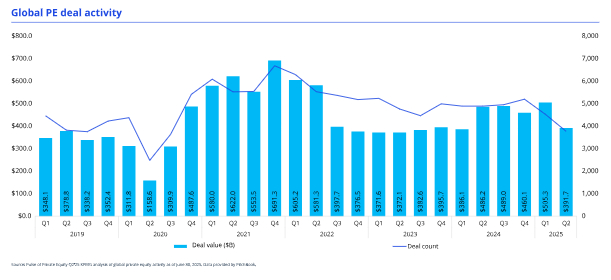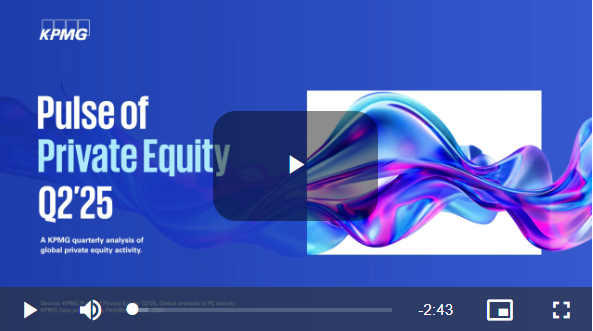- within Corporate/Commercial Law topic(s)
- in Australia
- within Corporate/Commercial Law, Food, Drugs, Healthcare, Life Sciences and Strategy topic(s)
- with readers working within the Law Firm industries
Global highlights of Q2'25
- Global PE investment totals $363.7 billion during Q2'25
- PE deal volume drops from 4527 deals globally in Q1'25 to 3,769 in Q2'25
- US sees $202.0 billion in PE investment in Q2'25 – more than half of global total
PE investors remain cautious amid lack of trade clarity
PE investment activity was somewhat muted in Q2'25, with proposed PE investment of $363.7 billion across 3,769 deals — down from $505.3 billion across 4,527 deals in Q1'25. Ongoing uncertainties related to tariffs, global trade, and supply chains, saw many PE investors holding back from signing deals despite a sustained volume of deals activity, particularly in the US.
Global private equity activity slows in Q2 2025 despite U.S. mega deals

In Q2 2025, the United States was home to the three largest private equity deals globally. Leading the quarter was Blackstone Infrastructure Partners' proposed $11.5 billion buyout of TXNM Energy, New Mexico's largest electric utility, amid ongoing consolidation in the U.S. power sector. The second-largest deal was the $10.5 billion proposed acquisition of portions of Boeing's Digital Aviation Solutions by Thoma Bravo. Rounding out the top three was 3G Capital's $9.4 billion take-private offer for Skechers USA, marking the end of the company's 26-year tenure as a public entity.
Despite these headline transactions, overall private equity investment declined sharply across all regions between Q1 and Q2 2025. In the Americas, investment fell from $319.8 billion to $213.9 billion, while in Europe, it dropped from $136.6 billion to $117.4 billion. Asia experienced the steepest decline, with investment decreasing from $36.2 billion to $20.85 billion quarter-over-quarter.
Deal volume followed a similar downward trend. The Americas saw a drop to 1,771 deals, down from 2,260 in Q1; EMEA recorded 1,669 deals, down from 1,850; and ASPAC reported 220 deals, down from 282. The decline in both deal value and volume reflects a more cautious stance among PE investors, many of whom are adopting a wait-and-see approach amid ongoing economic and geopolitical uncertainties.
Increasing shift away from globalisation towards regionalisation
Given current geopolitical tensions, tariff uncertainties, and supply chain concerns, PE dealmaking has increasingly shifted from a global approach towards a more regionally focused one, with PE investors increasing their focus on companies focused on domestic or regional markets in order to better control and manage trade risks. Areas like healthcare, biotechnology, and other sectors with a predominantly regional focus saw solid traction during Q2'25, while industries like automotive and manufacturing saw PE interest pull back given their cross-border dependencies and exposure to tariffs. While PE investors did not shy away entirely from global assets during the quarter, they significantly narrowed their focus to only the highest-value assets.
Trends to watch for in Q3'25
As Q3'25 begins, PE investors globally are expected to remain selectively optimistic — focusing on high-quality assets, resilient sectors such as AI infrastructure and energy, and companies with strong domestic positioning. While caution persists, investors will be watching closely for positive signals from the US administration, greater clarity around interest rate policy from the Federal Reserve, and continued signs of corporate strength. These indicators could help unlock greater confidence and spur more consistent deal activity in the second half of the year.
On the AI front, both data centres and related connecting infrastructure will likely see strong interest over the remainder of the year, particularly given the regional nature of many of these investments.
The slight upswing in PE exit activity will likely continue over the next quarter or two, with some of these coming from forced sale situations as PE funds face increasing pressure to return capital to their investors. The improvement in IPO exit value will be an area to watch as there is a lot of hope that the IPO market will continue to improve. Any improvement in the IPO market could help PE exits more broadly as it would give PE firms alternatives to private sales. Given the renewal of IPO activity in the US — even if the window isn't open fully — there will likely be an increase in dual track exits over the remainder of the year.
The content of this article is intended to provide a general guide to the subject matter. Specialist advice should be sought about your specific circumstances.





